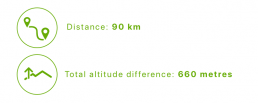Stage 3: with team effort we arrive to Trujillo!
In this stage we have united two of the cities with more personality of the province of Caceres. We left the capital and passed through small villages until we reached Trujillo, a monumental city with a very special charm.
The stage of just over 90 km has not been complicated, but there were a few ups and downs that challenged the resistance of the team. Precisely, the topic of discussion of the day was the importance of building climate resiliency and ensuring that this process is inclusive, so that no one is left behind.
We need to be aware that climate change is a serious ethical conflict that impacts mainly on the most disadvantaged sectors of the population and which is jeopardising the future of the coming generations. Policies need to address these vulnerabilities first so that these sectors can adapt and cope with the changing climate patterns and also so that mitigation efforts do not aggravate their situation.
The planet has already warmed by 1°C above pre-industrial levels and under current rates we are expected to breach 1.5°C between 2030-2052, according to the IPCC special report on global warming of 1.5°C. Whether and how we are able to limit temperature increase will greatly influence the resiliency of natural and human systems, which are already experiencing the impacts of the multiple observed changes in the climate system. If we fail to take action now, the irreversibility of the situation will mean that any future measures will be ineffective and much more expensive.
The best solutions of adaptation strategies to climate change will be born from the scientific endeavor to better understand the climate and social system. However, collaboration among scientists, decision-makers and stakeholders will be mandatory to properly focus the efforts of the former, and to successfully implement the strategies constructed among all of them.Manuel del Jesus - Instituto de Hidráulica Ambiental de la Universidad de Cantabria (IHCantabria)
We need to focus on Inclusion and accessibility when developing climate resilience. Remote, rural and poverty-laden communities are the most vulnerable to climate change but often have the least amount of access to technological advances.Anurag Saha Roy - Wikilimo; United Nations Competition Summer of Solutions Winner
Moving towards a greener economy is creating opportunities for new technologies, investment and jobs. At the same time, environmental change and in particular climate change has detrimental effects on certain economic sectors and can cause job losses. Identifying and providing the right skills for new and existing jobs can smooth transitions to greener economies and ensure that new opportunities benefit a broader share of society.Jorge Cattaneo - Ayuda en Acción
Climate change & inequities are linked: 1)most vulnerable people are experiencing the worst impacts of climate change 2)climate change is affecting the most in Global South countries, the poorer 3)inequity is intergenerational, our youth will be the most affected by our NO action.Fernando Mudarra - Ayuda en Acción

